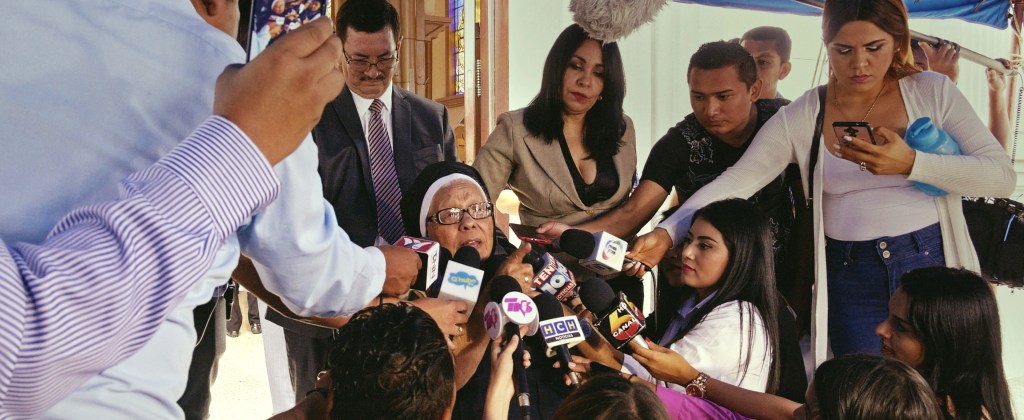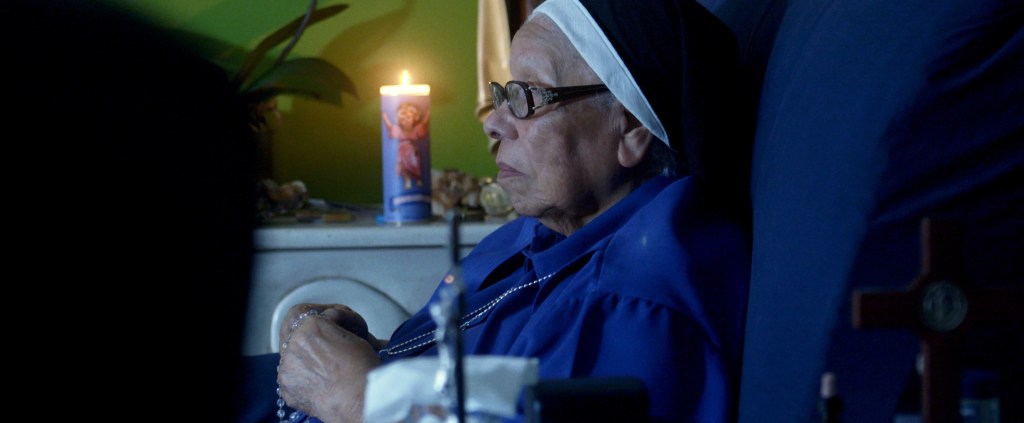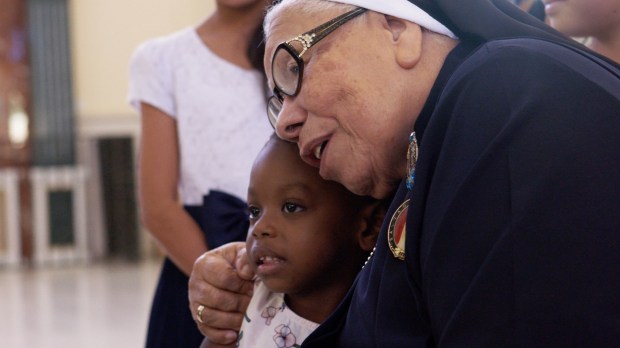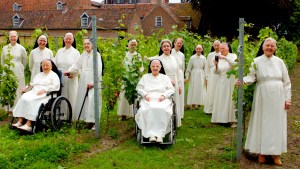The movie With This Light has been released today. It invites us to discover the incredible Sr. Maria Rosa Leggol — an orphan who went on to provide care for over 87,000 children and set up hundreds of innovative organizations for the vulnerable. The film also sheds a light on the enduring issues that women in particular are facing in her native Honduras.
With This Light is a documentary that takes us through the fascinating life of the Franciscan sister, who died at age 93. Despite only having a 4th-grade education, Sr. Maria Rosa displayed an entrepreneurial spirit on a par with a leading CEO, but with an added desire to serve the most vulnerable.
Aleteia had the opportunity to chat with the film’s co-director, Nicole Bernardi-Reis, along with executive producer Jessica Sarowitz, a highly accomplished businesswoman whose family originated from Honduras.
Talking to the women, both of whom knew Sr. Maria Rosa personally, it was possible to see the profound effect Sr. Maria Rosa had on them. They both want to spread awareness of this unique religious, as well as continue her work in their own way.
Here you’ll find some fascinating facts and anecdotes the pair shared about the much-loved and self-confessed “crazy” nun:
She was a woman with boundless energy, even at 93
Nicole Bernardi-Reis: When I first met Sister, she was literally twice my age, but had four times the energy and literally six times the projects. I was definitely thinking that there was more that I could do in the world, but I think that her message is about how even a 6-year-old can aspire to help the world; even a woman with a fourth-grade education can change a country. We have so much power in ourselves, inside of us, as long as we believe in ourselves, have the faith in people and in God … that you can help better the world.
JessicaSarowitz adds: I came across her when I was 8 years old, and later as an adult, and she gave the best hugs, I can tell you.
She was a bit of a trailblazer
Sarowitz explained that Sr. Maria Rosa was better known on an international scale in the 70s and 80s when she did the majority of her major works that expanded over the years. As Sarowitz shared: “She was very much an innovator in the 70s and 80s. She was one of the first women in the country who bought used clothing.” This cottage industry went on to prove vital for families to bring in a little extra income to their households and is now practiced throughout the country and beyond.

She always found solutions
Sarowitz: She was always looking to not only find solutions, but actually find the right people that wanted to work on these solutions. Sr. Maria Rosa would always say, “I’ve been praying to God, I’ve been praying to God, I have this problem and then you show up.” And it’s so completely authentic … and you’re like “Yeah, I’m here” put me to work …. then she puts you to work.
She had a myriad of qualities
In the film the elderly sister stated that you have to be “a little insane to do God’s work.” However, Sr. Maria Rosa had many other qualities.
Bernardi-Reis: She was very tenacious, very loving, very warm, very forward thinking. She knew there was a problem that needed to be solved before other people could even see it… She was really really funny, which helps a lot, she could talk to anyone, and as Jessica likes to say, she could move stone cold hearts.
Sr. Maria Rosa was also really driven by her faith. It’s something you can’t really quantify and I think people tend to dismiss that, but she gained all of her strength from her faith. She would get a lot of vision from her faith. She would get up at 2 o’clock in the morning and would pray and have her time with God every single day, and then she would just work until 11 o’clock at night.
She had a business brain and a spiritual heart — the craziness is the insanity, it’s the faith, it’s the vision, it’s the belief in the things we can’t see or can’t quantify that really drive us.
She’d never turn down kids
Sarowitz: Sister receives a call saying we’ve got 50 kids that need housing right away, they didn’t have the organization to take on 50 kids. But she would never turn down kids. So she said, “Yes, bring them to me. It will be OK.”
About an hour later a truck pulls in and there’s 52 mattresses from a furniture company. [The staff] are all stunned, that came out of the blue. That’s one of her great stories. The staff were like, I’m never going to doubt sister again. She had a special kind of foresight, a channel. And she knows it’s going to be okay. It’s like a lesson for us that sometimes we don’t have the faith that it will be okay. She had this interesting foresight, forward seeing.
[She had] a balance between an innocence that would radiate but [she was] also very savvy when it came to dealing with people and really listening to them, taking it all in. … She would always absorb it and radiate some kind of love, and healing and relief.
She showed how little acts truly do count
In the movie, we discover how Sr. Maria Rosa actually managed to stop a plane that was about to take off in order to get an urgent signature from a businessman that would enable her to pay for a housing project. Sarowitz gave a little more information about how she managed to stop that plane:
“She would always work at the clinic at night. Four months before the incident she delivered the pilot’s baby. When sister went out and was signalling to the pilot, the pilot had this sort of immediate reaction like, ‘Sister needs something, I need to react.’ There are no small acts of serving or kindness. The mystery is it happened to be that pilot, on that day, in that moment. This goodwill, this love gets passed on in a multiple and that’s the result.”
She always went forth with her Crucifix
Sarowitz: She really said that I never go anywhere without God, without Jesus present. It was almost like a shield. When she would go forth it would always be in her hand. It would never leave her hand. Or it was just right next to her.
I witnessed this. She would go into some pretty difficult neighborhoods, with gangs, notorious violent neighborhoods, but her pick-up truck would have her symbol on it. She would always have that Rosary at the front. And nothing ever happened to her. People were always happy to see her. People knew that she really did love them. And she would distribute her food baskets.

She loved her soccer and mariachi!
Along with all her work, Sr. Maria Rosa had a few passions. Bernardi-Reis shared how on one occasion, while filming, the elderly nun kicked out the camera crew so she could watch her soccer game in peace. She also recounted the time the sister put down her beloved crucifix so she could jig along to some mariachi.
She is credited with countless miracles
Sarowitz: There were clearly miracles — what I would call miracles — during her lifetime because so many people have come and presented themselves. “Sister, you did this, I couldn’t have children and I prayed to you.’
There is currently a committee working on a cause for Sr. Maria Rosa’s canonization.



